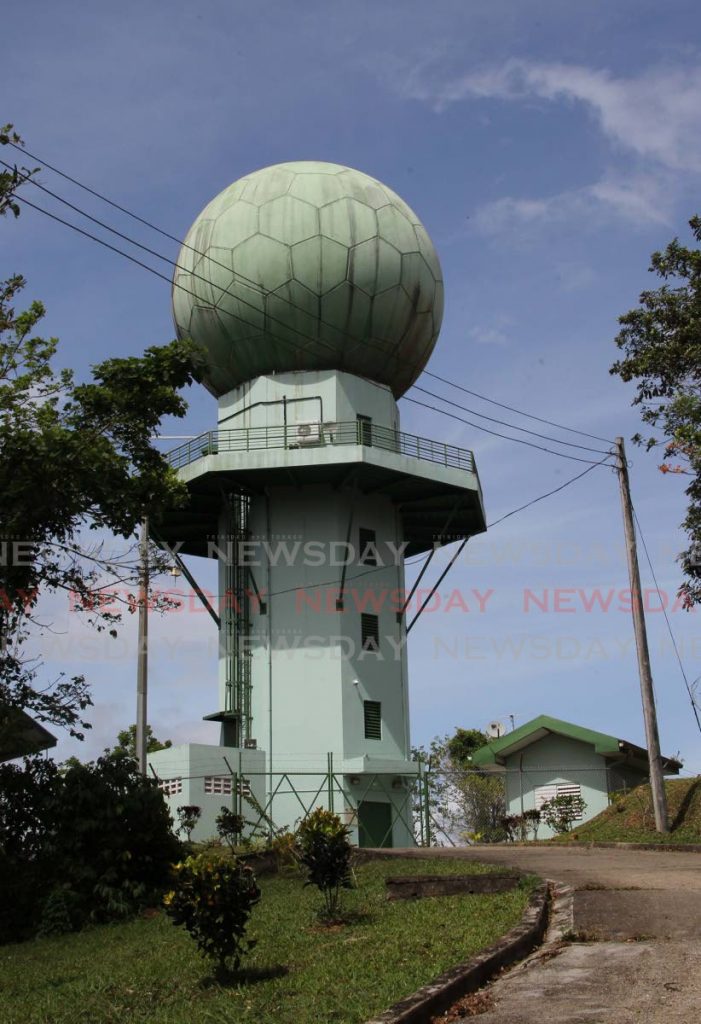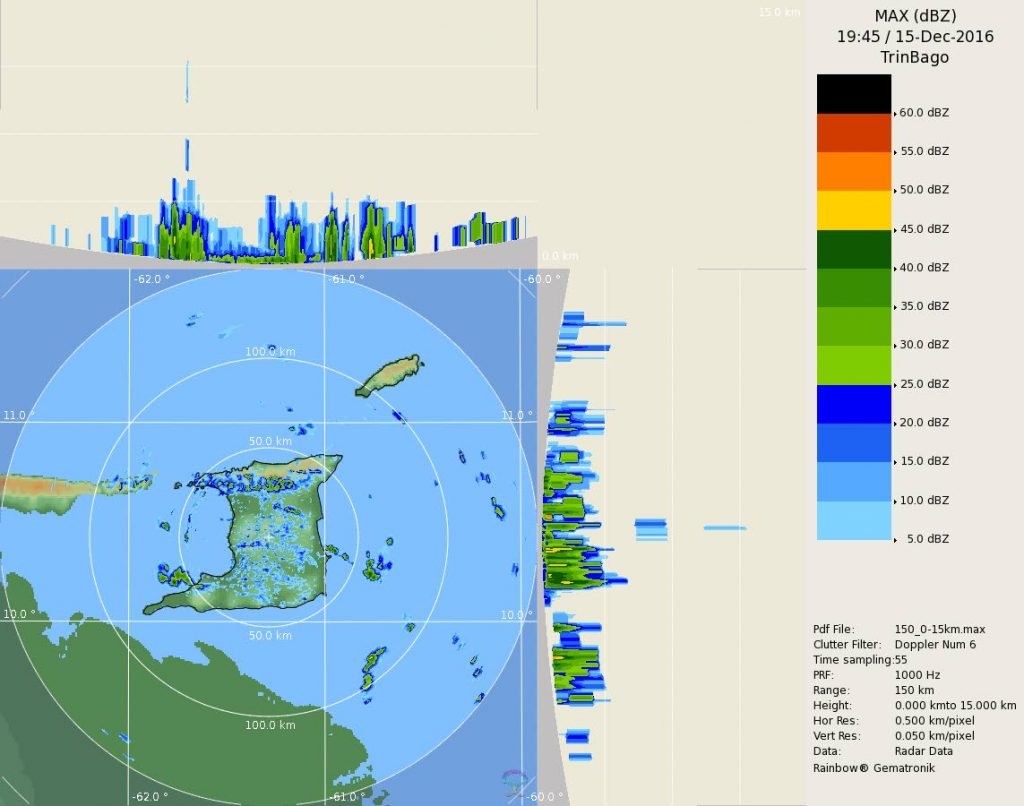Inaccurate forecasts at Met Office

The Meteorological Service of TT's (MET) forecasts are sometimes inaccurate because of broken or poorly calibrated equipment, a senior staff member has said.
So its offices are woefully underprepared for the present rainy and hurricane seasons.
He said the state entity, which operates out of the terminals at the old Piarco Airport, is also unhygienic and many staff demoralised because of apparent unfair work practices, encouraged by managers and those in higher authority.
Newsday interviewed a number of stakeholders who, on the condition of anonymity, shared their dissatisfaction with daily operations at the Met Office. They have complained of issues ranging from faulty or completely broken equipment to the infestations of pests.
Because of this, the staff say they cannot produce what is being asked of them. They allege that the many complaints and concerns expressed to those in authority have been met with indifference.
A senior employee claimed a recent change of directors has worsened the work atmosphere, instead of them "working to improve conditions and equipment for the essential services."
One person was fired last year, according to several employees, because he was becoming a "more recognised voice and social media presence" than the Met Office itself.
"He made one mistake and they used it as an excuse to get rid of him."
In addition, "It's always a fight to get the Airports Authority or Met Office to make repairs."
He said there are leaking roofs, faulty staircases, non-functioning air-condition units and poorly calibrated or non-functioning equipment, among other serious concerns.
Then he says there are incompetent managers, who force staff to do tasks which their job specifications do not include.

"They do so saying the junior staff have no work to do. Meanwhile, senior management themselves have shunted their responsibilities onto OJTs (On-the-Job Trainees) or simply do not do the tasks they are responsible for. None of them are taken to task.
"And while there are one or two of the managers who would try to make a difference, there is little or no support."
The administrative staff, he said, sometimes make salaries for contract workers and remuneration for staff's travelling claims into a "muddle of incompetence," leaving them to wait months before they are paid out.
"The synoptic staff (who summarise data) have been subjected to an office with no showers, even though it is a 24/7 essential service," he said, adding that the toilets are outdated and carpets have been unchanged in decades.
"In all it is a truly unsanitary office.
"Our cleaners do a fantastic job, but there is only so many times a carpet can be vacuumed before it outlives its expectancy."
He said in terms of technology, the increased capabilities of computers, satellites and radar, have made several tasks redundant, like the plotting and analysing charts which, he says, some see as a reduction of their workload and "a reason to shunt other duties onto other officers.
"There were several reclassification exercises in the Met Service," he said. "However, the Met assistants were never reclassified (after 60 years). Now new tasks are being assigned without discussion with the union or consideration for additional compensation."
He lamented a reduction of funding for equipment and maintenance, "since during rainy season, the Met Office is the one the entire population turns to for guidance.
"The radar has been down for close to 18 months (and) the proposal for a new (NASA-operated) GOES-16 satellite imagery system is somewhere buried under the red tape. The radar and GOES-16 satellite are critical to our operations. It serves to alert us to the weather around us and what is approaching and how severe it is. The satellite especially gives us a view of the weather far to the east of us and around, while the radar gives real-time data to the east, especially during the hurricane season. It is essential equipment."
Equipment at the Met Office has been poorly maintained for years, he said, because those who are familiar with the equipment are long gone.
"From the outset, the usual repair schedules and even simple charts for recording data were impossible to source or incorrect charts were purchased," he said, putting it squarely as a matter of incompetence.
"Putting staff who are not aware of the intricacies related to the equipment, the charts, the times for the charts to be be used; the type of paper to be used, et cetera."
The Met office takes the data, which he says is "woefully inaccurate" and uses them "as gospel to generate climate data and sell this data," knowing how inaccurate it is.
A number of industries rely on the data, including oil and insurance. Students also use it regularly for research.
"These readings may only be one or two degrees, but the difference lies in when you say the max for the day was 32 or 33 when it should really be 34 or 35. It affects the heat index and humidity, etc.
"Now, to the layman, it may just be numbers. But when applied to climate data, it will throw off the data tremendously, especially when this data is being used for research and other applications.
In terms of human resources, he spoke of instance in which a person retired and received all benefits but returned to work on contract.
"Now that person is being paid his salary, yet is being given time off earned while he was in the service five years ago.
"These are, in fact, burdens the taxpayer has to face … millions being squandered because the managers have decided to spread the wealth through extra days off for the contract workers, who are not entitled to it.
"Then, there are automatic weather stations and other very expensive equipment which have never worked well," he said, using an example of a hydrothermometer which was purchased several years ago but was never used because, as he said, "the equipment repairmen requested training and the director did not see the need for training."
Director: Grouses could be political
Newsday reached out to Met Service director Ezekiel Sampson, recently. Sampson, who was promoted from assistant director, did not confirm nor deny most of the claims made by the staff.
"I maintain that if there are issues that are internal to these officers, I think the appropriate forum at first is that we address it internally," Samspson said.
"And if for some reason, they feel that those issues have not been sufficiently addressed then you take it to the next avenue, which is dealing with the permanent secretary and take it to the minister, and possibly involve the union."
Asked whether he felt the Met Service was appropriately equipped and providing accurate information, he replied, "As with any organisation, we can't get too comfortable with our position. We must always seek to do better.
"Issues concerning equipment, I would prefer to have them addressed internally. It's all subject to the availability of resources. They are not a result of anybody's inability to deal with the issues.
He admitted much of the equipment is old. "Because of wear and tear, you would have these issues arising. It's like an old car. It doesn't matter how often you change the brakes, the wear and tear, and the age of the vehicle, issues will continue to arise."
Newsday asked if he intended to deal with the issues, he said, "With elections coming up, I don't know if the issues are political or if someone is creating mischief."
However, the staff insist these problems span decades. Most also insist they are uninterested in politics and that there is no reason to suggest they have ulterior motives.
One told Newsday, "To say this is political is clearly deflecting from situations which have arisen since the period under Panday. Ganga Singh came and tried to change the office and nothing happened. So since then the govt has recognised that the Met office needs to be changed. But nothing after 20-plus years."
On August 10, the People's National Movement candidate Marvin Gonzales was elected Member of Parliament for for Lopinot/Bon Air West. He was also appointed Minister of Public Utilities under which the Met Service falls.
Newsday has reached out to Gonzales but was unable to get a comment by the time of publication.
The staff say they hope the minister notes their concerns and meets with them to improve standards at the organisation.


Comments
"Inaccurate forecasts at Met Office"